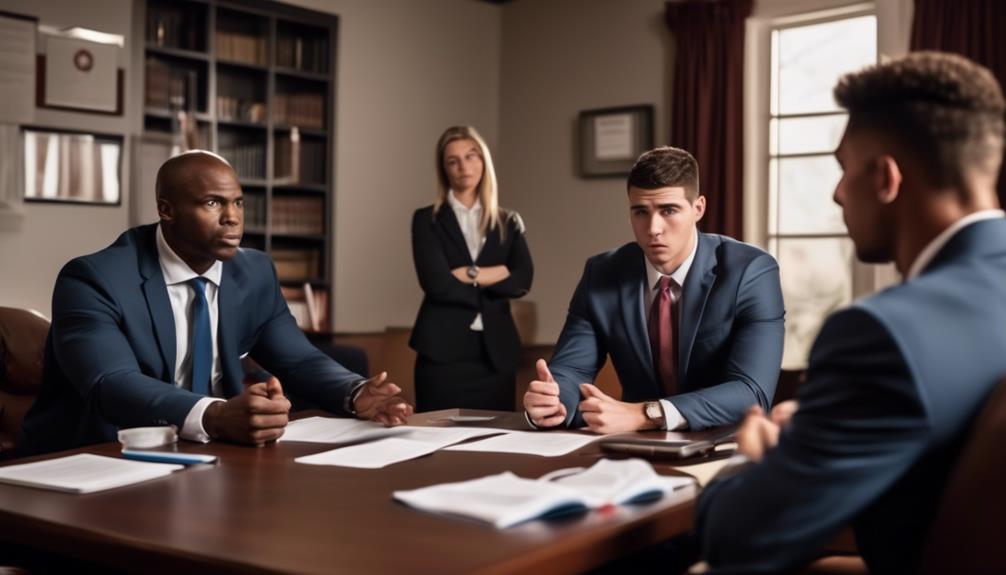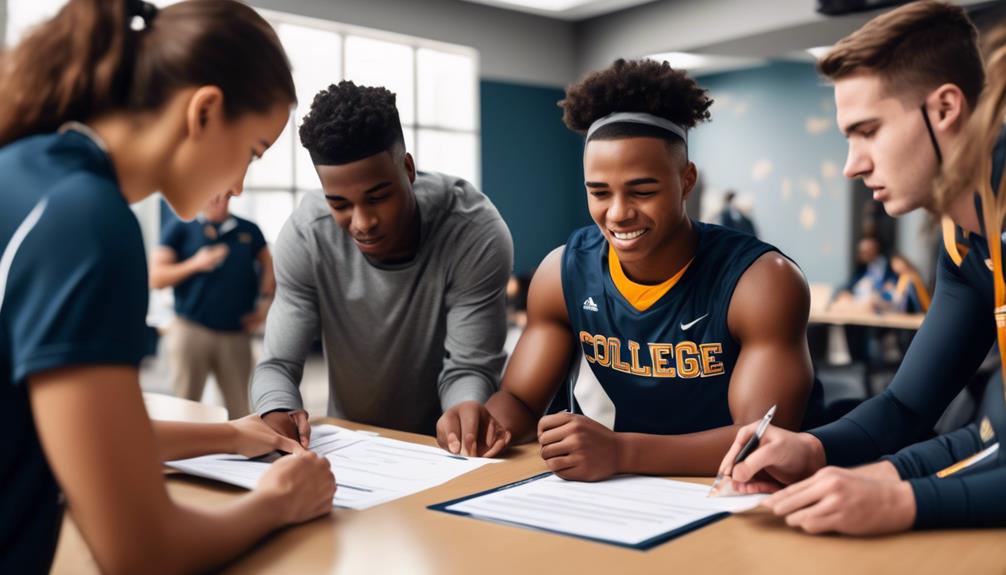Mastering Sports Law in College Athletics: A How-To
So, you're about to embark on a journey into the complex world of sports law in college athletics.
Did you know that according to a recent survey, over 80% of college athletic departments have faced legal challenges related to NCAA regulations, athlete eligibility, and contract negotiations?
As you dive into this how-to guide, you'll gain valuable insights into mastering the intricacies of sports law in college athletics.
From understanding NCAA regulations to navigating athlete eligibility and addressing name, image, and likeness (NIL) rights, this comprehensive guide will equip you with the knowledge and strategies to confidently navigate the legal landscape of college sports.
Understanding NCAA Regulations
To navigate the complex landscape of college athletics, you need to understand the intricate web of NCAA regulations governing eligibility, recruiting, and competition. NCAA compliance is crucial to ensure that student-athletes maintain their eligibility to participate in collegiate sports. Failure to adhere to these regulations can lead to serious legal implications for both the athletes and the institution.
One of the key aspects of NCAA compliance is understanding the rules and guidelines surrounding recruiting. The NCAA has strict regulations on when and how coaches can contact prospective student-athletes. Violating these rules can result in severe penalties for the school, including fines and limitations on recruiting activities. As a coach or athletic staff member, it's essential to stay informed about these regulations to avoid any legal repercussions.
Moreover, maintaining eligibility for student-athletes requires a deep understanding of NCAA regulations. From academic requirements to amateurism rules, there are various factors that can impact a student-athlete's eligibility status. Ensuring compliance with these regulations isn't only necessary for the athlete to participate in competitions but also to safeguard the integrity of the institution.
Familiarizing yourself with NCAA compliance isn't just about following rules; it's about upholding the values of fair play and sportsmanship. By staying informed and proactive in understanding NCAA regulations, you can protect both the athletes and the college from potential legal issues while fostering an environment of integrity and respect within college athletics.
Navigating Athlete Eligibility
Navigating athlete eligibility requires a thorough understanding of NCAA regulations and a proactive approach to compliance. To ensure eligibility, athletes must adhere to amateurism rules and academic requirements set by the NCAA. It's crucial to monitor compliance issues and address them promptly to avoid jeopardizing an athlete's eligibility.
Amateurism rules dictate that athletes can't receive payment or benefits beyond their educational expenses for participating in sports. Understanding these rules is essential to avoid inadvertent violations that could impact an athlete's eligibility. Additionally, meeting academic requirements is vital for maintaining eligibility. Student-athletes must achieve a minimum GPA and make satisfactory progress toward their degree to remain eligible to compete.
When facing compliance issues, seeking eligibility waivers can help navigate challenges. Eligibility waivers provide the opportunity to request exceptions to NCAA rules, such as obtaining a medical redshirt or regaining eligibility after transferring to a new institution. Navigating the process of eligibility waivers requires a comprehensive understanding of NCAA regulations and a proactive approach to presenting a compelling case.
Protecting Athlete Rights
Athletes' rights must be safeguarded through proactive legal measures and advocacy within the complex landscape of college athletics.
When it comes to protecting athlete rights, one crucial aspect is ensuring proper athlete representation. Athletes often face complex contracts, endorsement deals, and employment agreements, making it essential for them to have knowledgeable legal representation to navigate these intricacies. By having legal experts in their corner, athletes can ensure that their rights are protected and that they receive fair treatment in all aspects of their college athletic careers.
Additionally, protecting athlete rights involves addressing potential labor disputes. College athletes are increasingly vocal about their rights, particularly in areas such as compensation, working conditions, and healthcare. Legal support is vital in advocating for fair treatment and ensuring that labor disputes are resolved in a manner that upholds the rights of the athletes. This may involve negotiating with athletic programs, addressing grievances, or even pursuing legal action when necessary.
Contract Negotiation Strategies
When negotiating contracts in college athletics, it's essential to carefully consider the terms and conditions that best serve your interests and career goals. Negotiation tactics play a critical role in ensuring that you secure a contract that aligns with your needs and aspirations. As a college athlete, understanding the legal obligations and implications of the contract is vital for protecting your rights and setting the stage for a successful career.
One crucial negotiation tactic is to thoroughly research and understand the market value for athletes in your particular sport and position. This knowledge empowers you to negotiate from a position of strength and ensures that you aren't undervalued in the contract. Additionally, seeking legal counsel to review and advise on the terms of the contract can provide valuable insights into potential pitfalls and opportunities for improvement.
When engaging in contract negotiations, it's essential to be clear about your career goals and personal boundaries. Communicating these factors effectively can help in shaping the terms of the contract to better suit your needs. Moreover, being prepared to walk away from a deal that doesn't align with your objectives can sometimes be a powerful negotiation strategy.
Understanding your legal obligations within the contract is equally important. This includes being aware of any performance expectations, code of conduct requirements, and dispute resolution mechanisms. By navigating the negotiation process with a clear understanding of your legal rights and obligations, you can secure a contract that supports your athletic career while protecting your interests.
Handling Disciplinary Actions

In college athletics, understanding the protocol for handling disciplinary actions is crucial for maintaining professionalism and integrity in your career. When it comes to disciplinary procedures, you must be well-versed in the following key aspects:
- Knowledge of Governing Rules: Familiarize yourself with the disciplinary procedures outlined by the NCAA or relevant athletic governing body. Understanding the rules and regulations will help you navigate the process effectively when representing athletes facing disciplinary actions.
- Effective Communication: Clear and open communication is essential when handling disciplinary actions. As the representative of the athlete, you need to effectively communicate with the athletic department, coaching staff, and legal counsel to ensure that the athlete's rights are upheld throughout the process.
- Strategic Advocacy: It's crucial to advocate for the athlete while adhering to the established disciplinary procedures. Developing a strategic approach to presenting the athlete's case and addressing any violations is integral to achieving a fair outcome.
- Ethical Considerations: Upholding ethical standards is paramount when representing athletes in disciplinary matters. Maintaining the integrity of the process and advocating for fair treatment aligns with the professional responsibilities of athlete representation.
Mastering the handling of disciplinary actions in college athletics requires a comprehensive understanding of the disciplinary procedures, effective communication, strategic advocacy, and ethical considerations. As you navigate these processes, your expertise in athlete representation will play a pivotal role in safeguarding the rights and interests of the athletes you represent.
Addressing Name, Image, and Likeness (NIL) Rights
Understanding the impact and implications of Name, Image, and Likeness (NIL) rights is essential for navigating the evolving landscape of college athletics. With recent changes in regulations, college athletes can now capitalize on their NIL through marketing opportunities, sponsorship deals, athlete endorsements, and brand partnerships. This shift has opened up a new realm of possibilities for student-athletes to leverage their personal brand and monetize their image and likeness.
NIL marketing presents a unique opportunity for college athletes to partner with brands and businesses, allowing them to profit from their name, image, and likeness. This could involve appearing in advertisements, promoting products on social media, or making personal appearances on behalf of a sponsor. These partnerships can be mutually beneficial, providing exposure for the brand while enabling the athlete to earn income.
Sponsorship deals are another avenue for athletes to explore. These agreements can range from traditional endorsements to more comprehensive partnerships, where athletes become ambassadors for a brand. As a college athlete, navigating these opportunities requires a keen understanding of contractual obligations, legal implications, and the potential impact on amateur status and eligibility.
In light of these changes, it's crucial for student-athletes to approach NIL rights with a strategic mindset. Seeking guidance from legal professionals and industry experts can help athletes navigate the complexities of NIL marketing and sponsorship deals, ensuring that they make informed decisions that align with their long-term goals and aspirations.
Managing Transfer and Recruitment Rules

Navigating the intricate regulations surrounding college athlete transfer and recruitment rules can be a challenging yet crucial aspect of collegiate sports management. Understanding the nuances of these rules is essential for ensuring compliance and maintaining a fair and competitive athletic program. Here's what you need to know:
- Transfer Exceptions: Familiarize yourself with the transfer exceptions allowed by the NCAA. These exceptions may include waivers for immediate eligibility based on specific circumstances, such as family hardship, academic issues, or graduate transfers. Understanding these exceptions is vital for facilitating smooth transitions for student-athletes.
- Recruitment Violations: Stay informed about the recruitment violations that can jeopardize your program's reputation and eligibility status. Be aware of the prohibited recruitment activities and ensure that your staff and student-athletes are well-versed in the rules to avoid unintentional violations.
- Compliance Monitoring: Implement robust compliance monitoring systems to track transfer and recruitment activities. Regularly review and update your policies and procedures to align with the latest NCAA regulations and guidelines.
- Educational Initiatives: Invest in educational initiatives to educate both staff and student-athletes about transfer and recruitment rules. By fostering a culture of compliance and accountability, you can mitigate the risk of rule violations and uphold the integrity of your athletic program.
Mastering the intricacies of transfer and recruitment rules is fundamental for safeguarding the integrity and eligibility of your college athletics program. Stay proactive, stay informed, and prioritize adherence to these regulations to navigate this aspect of sports law effectively.
Exploring Legal Issues in Athletics Governance
To effectively navigate the legal landscape of athletics governance, it's essential to understand the intricate regulations and compliance requirements that shape the management of college sports programs. When exploring legal issues in athletics governance, it's crucial to consider athlete representation and sponsorship agreements.
Athlete representation involves the legal aspects of athletes being represented by agents or legal counsel in contractual negotiations and other matters related to their participation in college athletics. This includes understanding the laws and regulations that govern athlete-agent relationships, as well as the rights and responsibilities of both parties.
Additionally, sponsorship agreements play a significant role in athletics governance, as they involve legal considerations related to partnerships between college sports programs and corporate entities. These agreements often encompass a wide range of legal issues, including intellectual property rights, licensing, endorsements, and compliance with regulations set forth by governing bodies such as the NCAA.
In the realm of athlete representation, legal issues can arise regarding the negotiation and enforcement of contracts, compliance with NCAA rules, and the protection of athletes' rights. Understanding the legal framework surrounding athlete representation is essential for colleges and universities to ensure compliance and support their athletes' best interests.
Similarly, navigating sponsorship agreements requires a comprehensive understanding of contract law, intellectual property rights, and sports marketing regulations.
Frequently Asked Questions
Can Student-Athletes Use Their Name, Image, and Likeness (Nil) Rights to Endorse Products or Services While Still in College?
Yes, college athletes can use their NIL rights to endorse products or services. However, there are legal implications to consider.
While it opens up commercial opportunities, it's crucial to navigate endorsement deals carefully to avoid violating NCAA rules or breaching existing contracts.
Understanding the complexities of name and image rights is essential for college athletes looking to capitalize on their commercial opportunities while staying compliant with sports law regulations.
How Do College Athletic Departments Handle Situations Where a Student-Athlete's Eligibility Is in Question Due to Academic or Disciplinary Issues?
When handling eligibility challenges in college athletics, athletic departments provide academic support to student-athletes facing academic issues and ensure due process for those facing disciplinary actions.
Academic support includes tutoring, study skills, and academic advising to help student-athletes succeed.
Disciplinary actions follow a fair due process, ensuring student-athletes receive a fair hearing and the opportunity to present their side.
These measures aim to support student-athletes in their academic and athletic pursuits.
What Legal Protections Are in Place for Student-Athletes in Cases of Injury or Medical Negligence?
As a student-athlete, you have legal protections in cases of injury or medical negligence. These protections include the right to pursue legal action for medical malpractice and to seek compensation for any harm caused by negligent medical treatment.
Student athlete rights are designed to ensure that you receive proper medical care and are fairly compensated if medical negligence occurs. It's important to be aware of these rights and seek legal counsel if necessary.
How Are Contracts Negotiated for Student-Athletes Who Are Considering Professional Sports Careers?
When negotiating contracts for student-athletes eyeing professional sports, it's crucial to employ strategic negotiation strategies. Seek legal representation to ensure fair terms and protections.
Understand the nuances of the deal, and be assertive in advocating for favorable terms. Consider the long-term implications and seek legal advice to navigate complex contract language.
Negotiating from a position of knowledge and strength can lead to a more advantageous outcome for student-athletes.
What Are the Legal Implications for College Athletic Programs When Recruiting Student-Athletes From Other Schools or When Athletes Transfer Between Programs?
When recruiting student-athletes from other schools, college athletic programs must navigate recruiting ethics to ensure fair play and avoid violations.
Transfer regulations dictate the process for student-athletes switching programs, impacting eligibility and scholarship opportunities.
Understanding these legal implications is crucial for college athletic programs to maintain compliance and uphold the integrity of the recruiting and transfer processes.
Conclusion
Now that you've mastered the basics of sports law in college athletics, you're ready to navigate the complex legal landscape of NCAA regulations, athlete eligibility, rights protection, contract negotiation, disciplinary actions, NIL rights, transfer and recruitment rules, and governance issues.
By understanding and applying these strategies, you can ensure that athletes, coaches, and institutions operate within the boundaries of the law while maximizing their opportunities and success in the world of college sports.
Keep learning and stay informed to stay ahead in this competitive field.
